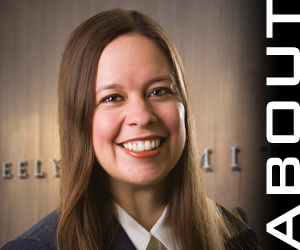Ethics Engaged | Fall 2016
Dotting the ‘I’ in Ethics
Accounting professionals who possess integrity are more valuable...

Elizabeth Pittelkow Kittner
CFO and Managing Director, Leelyn Smith LLC
Exploring Ethics in Business & Finance Today
INTEGRITY—it is the cornerstone of our accounting profession. It elevates our value. It elevates our character.
As accountants, we must maintain integrity as part of our Code of Professional Conduct, and far more importantly than simply following a code, we must maintain ethics and integrity to be considered trusted advisors to those we serve in the business world and to safeguard our profession’s brand.
How does it make you feel when you hear a news story about an accountant who has behaved unethically, committed a fraud, or worse? Do you think it could never happen to you? Are you sure you would act any differently?
Think about it. Perhaps a sample size you are testing has errors you cannot isolate. Would you select an additional sample for testing? What if you were financially incentivized or pressured to finish your testing as quickly as possible? Or what if a vendor that has been loyal to you for years asks you not to disclose a bad decision it has made? Can you imagine these scenarios or others that might prompt you to think about changing your behavior? When you brainstorm which types of scenarios might occur, it becomes easier to recognize them when they do.
Most often our integrity is put to the test when we find ourselves in stressful situations. Whatever you pour into yourself, however, is what will pour out of you—make it a habit to promote ethics and integrity in your day-to-day life, your work, thoughts, conversations and relationships, and that is what will pour out of you.
It is important to talk about ethics and integrity with your family, friends and colleagues. When people know that you are serious about ethics and integrity, they will be comfortable with you leading the way through tough situations, and maybe more importantly, they will know not to put you in a position that could violate your personal or professional integrity.
How we develop our moral behavior stems from many different sources in our lives, and the people we surround ourselves with play a critical role. In childhood we forge our sense of right versus wrong. As we grow, we refine our ethical decision-making by observing others and learning from our own experiences. As accountants, we should be familiar with the AICPA Code of Professional Conduct as a minimum standard to apply to our work; other influences may come from our friends, colleagues, religion and education. Each of us has a varying frame of reference determined by upbringing, life experience and exposure to ethical scenarios, which all contribute to how we ultimately behave.
So just how do you make better, more ethical decisions and continue to enhance your integrity?
First, you must open your mind.
As human beings, we dislike not knowing information, and our brains will try to fill in the gaps, skewing our perceptions by looking for information to support our thoughts. For instance, if we suspect that an employee is unethical, we will seek ways to confirm rather than disprove that belief. This behavior is known as “confirmation bias.” Once we make a decision, our brain then convinces us that we made the right choice and we will defend it. This behavior is known as “choice-supportive bias.”
Here is where working with those whose decisions you trust will serve you well.
Collective decision-making and transparency will improve the integrity of your decision-making, help you understand the rationale behind decisions, mitigate biases, and keep you accountable to act with ethics and integrity in mind. After all, if you feel you need to hide your rationale from anyone, it could be a sign that you are not making the most ethical choice.
Second, you must open yourself up. Ask people how they view your integrity in both professional and personal settings. Align yourself with people who possess the values you want to emulate and those who have handled ethical dilemmas well. If desired, look for a mentor to help (I suggest the Society’s Women’s Mentoring Circles or Ethics Committee).
Of course, you can always educate yourself about ethics by reading books and articles, attending sessions concerning ethics and asking others about their experiences. However you decide to do it, your life-long commitment to ethics and integrity and their application will serve as one of the most important aspects of your career—and you will positively impact the profession’s reputation.